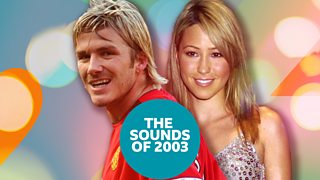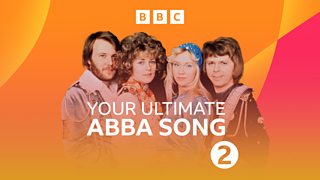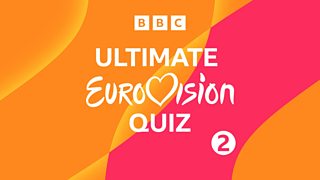How we got here - remembering the 27 years since the UK last won Eurovision
Updated May 2024

Back in 1997, Katrina and the Waves helped the UK to its fifth - and to date final - Eurovision victory. Two runners-up spots and five last places later, we look back at the story of Eurovision since that night.
Below we celebrate all the highs and lows, including the UK entrants you may have forgotten, each year's winning entry, and a selection of standout Eurovision moments from the end of the 1990s to the start of the 2020s...
Listen to Eurovision 2024 coverage on ±«Óãtv Radio 2 and ±«Óãtv Sounds live, then on-demand for 30 days.
- Grand Final with Scott and Rylan - from Saturday 11 May, 8pm
- Semi Final 2 with Richie Anderson - from Thursday 9 May, 8pm
- Semi Final 1 with Richie Anderson - from Tuesday 7 May, 8pm
1998
Who represented the UK? Imaani - Where Are You (runners-up!)
Who won? Dana International - Diva (Israel)
Memorable moments: Following Katrina and the Waves' win for the UK in 1997, the contest took place in Birmingham with Terry Wogan and Ulrika Johnson on presenting duties - this was the eighth time the nation had hosted it, a record that still stands despite the country's 'disappointing' form for much of the 21st century.
The UK's entry Imaani may not be that well remembered, but she did the nation proud, coming a very respectable second, a feat that took 24 years and Sam Ryder to match in 2022.
The night though belonged to Israel's Dana International, the first openly transgender artist to win the contest.
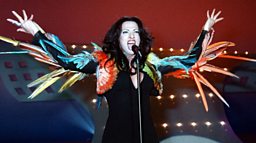
1999
Who represented the UK? Precious - Say It Again (12th)
Who won? Charlotte Nilssen - Take Me To Your Heaven (Sweden)
Memorable moments: The final Eurovision of the 20th century marked a downturn in fortunes for the UK following first and second placings in the previous two years; it was also the first time since 1987 the UK was placed outside the Top Ten. Meanwhile changes were afoot that meant participants could choose which language they sang in, having previously been restricted to one of the official languages of the country they were representing. And music was no longer required to be performed live, meaning the end of the orchestra and the arrival of pre-recorded backing tracks.
2000
Who represented the UK? Nicki French - Don’t Play That Song Again (16th)
Who won? Olsen Brothers - Fly on the Wings Of Love (Denmark)
Memorable moments: 13,000 spectators were at the final in the Globen Arena in Stockholm, which was a new record. As well as the millions watching on TV around the world, viewers could for the first time watch the contest on the internet - whatever happened to that?! The Big Four (now Big Five) was introduced from this contest onwards - France, Germany, Spain and the UK (plus now Italy) became exempt from the relegation rules and automatically qualify for the final, due to the amount of financial backing they give the competition.
2001
Who represented the UK? Lindsay Dracass - No Dream Impossible (15th)
Who won: Tanel Badar, Dave Benton & 2XL - Everybody (Estonia)
Memorable moments: Aqua’s interval performance on home soil featured a medley of their hits from the previous few years, including Barbie Girl.
2002
Who represented the UK? Jessica Garlick - Come Back (3rd)
Who won? Marie N - I Wanna (Latvia)
Memorable moments: Latvia were surprise winners as they were actually relegated - but as the highest-scoring country of those who were relegated, they were called back in to the competition when Portugal had to drop out. Meanwhile, Malta came 2nd, their best ever Eurovision result. It would be another 20 years before the UK bettered their third place finish this year, courtesy of former Pop Idol contestant Jessica Garlick.
2003
Who represented the UK? Jemini - Cry Baby (26th)
Who won: Sertab Erener - Everyway That I Can (Turkey)
Memorable moments: The UK finished last for the first time ever with nul points, beginning an era of struggles for the former winners. Meanwhile, the Belgian entry (Urban Trad - Sanomi) was performed in an ‘imaginary’ language and came 2nd.
-
![]()
Listen to The Sounds of 2003
Remembering Jemini's nul points and other key moments in music, news and popular culture in 2003
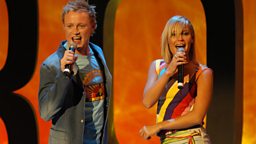
2004
Who represented the UK? James Fox - Hold On To Our Love (16th)
Who won? Ruslana - Wild Dances (Ukraine).
Memorable moments: In only their second Eurovision, victory went to Ukraine for the first time. Semi finals were introduced after an influx of new countries joining Eurovision in 2003. Another first, the entire contest was released on DVD - ±«Óãtv iPlayer and other catch-up services were still a few years away from launch!
2005
Who represented the UK? Javine - Touch My Fire (22nd)
Who won? Helena Paparizou - My Number One (Greece)
Memorable moments: Greece won the contest for the first time after 31 years of participation (hot on the heels of their footballers’ Euro 2004 victory). Elsewhere all the “Big Four” countries ended up as the “Last 4” - the 4 lowest scoring participants in the final. This was the fiftieth Eurovision Song Contest.
2006
Who represented the UK? Daz Sampson - Teenage Life (19th)
Who won? Lordi - Hard Rock Hallelujah (Finland)
Memorable Moments: Finland enjoyed their first win in 45 years of competing, the longest time a country had participated without a win at that point. Ireland’s Brian Kennedy performed the 1000th song of the contest with Every Song Is A Cry For Love in the semi final.
2007
Who represented the UK? Scooch - Flying The Flag (For You) (22nd)
Who won? Marija Serifovic - Molitva (Serbia)
Memorable moments: Serbia won the contest in the first year participating as an independent country.
2008
Who represented the UK? Andy Abraham - Even If (25th - last place for the second time)
Who won? Dima Bilan - Believe (Russia)
Memorable moments: For the first time the winners actually got given a physical trophy. Previous winners Ireland bowed out at the semi-final stage with Dustin the Turkey failing to impress.
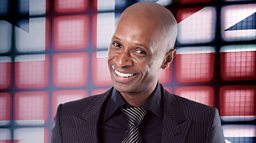
2009
Who represented the UK? Jade Ewen - It’s My Time (5th)
Who won? Alexander Rybak - Fairytale (Norway) with a record-breaking score of 387 out of a possible 492, at the time the highest-scoring song in the history of the competition.
Memorable moments: The United Kingdom scored its best placing since 2002 when Jade Ewen finished in fifth place with the song My Time, written by Dianne Warren and composed by Andrew Lloyd Webber. It was the last time until Sam Ryder in 2022 that the UK made the Top 5.
2010
Who represented the UK? Josh Dubovie - That Sounds Good To Me (25th)
Who won: Lena - Satellite (Germany)
Memorable moments: The 55th edition of the contest was won by Germany’s Lena Meyer-Landrut with “Satellite”. This was the first 'Big Five' win since the introduction of the semi-finals.
2011
Who represented the UK? Blue - I Can (11th)
Who won? Ell and Nikki - Running Scared (Azerbaijan)
Memorable moments: Jedward, who’d found fame on the X-Factor, participated for the first time. They represented Ireland with the song Lipstick
2012
Who represented the UK? Engelbert Humperdinck - Love Will Set You Free (25th)
Who won: Euphoria by Loreen (Sweden)
Memorable moments: Following her Eurovision success, Loreen reached number 1 in several countries and in 2022 the track was named among the top 5 most streamed Eurovision tracks of all-time. The UK’s entry Engelbert Humperdinck performed carrying a necklace, a gift from Elvis Presley, to bring him luck.
2013
Who represented the UK? Bonnie Tyler - Believe in Me (19)
Who won? Emmelie De Forest - Only Teardrops (Denmark)
Memorable moments: First year of the Parade of Nations - which had been introduced in the Junior Eurovision Song Contest - with all competing countries presenting themselves with their national flags at the start of the contest.

2014
Who represented the UK? Molly - Children Of The Universe (17th)
Who won? Conchita Wurst - Rise Like A Phoenix (Austria)
Memorable moments: Conchita aka singer and drag queen Thomas Neuwirth became an instant star. Runner-up Calm After The Storm by The Common Linnets (Netherlands) was this year’s competition’s highest charting single in the UK charts, reaching No. 9 (only the fourth non-winning Eurovision song from outside the UK to enter the top ten). Meanwhile, Radio 2 celebrated Eurovision with a four day 'pop-up' DAB service, that would also return in 2015.
2015
Who represented the UK? Electro Velvet - Still In Love With You (24th)
Who won? Mans Zelmerlow - Heroes (Sweden)
Memorable moments: The 60th Eurovision Song Contest, and to mark the occasion Australia was invited to take part in the Grand Final for the very first time, achieving 5th place. Both Germany and Austria scored zero points - Austria becoming the first host country ever to do so.
2016
Who represented the UK? Joe and Jake - You’re Not Alone (24th)
Who won? Jamala - 1944 (Ukraine)
Memorable moments: Justin Timberlake performed in the interval, debuting his hit single Can’t Stop the Feeling from the Trolls movie.
2017
Who represented the UK? Lucie Jones - Never Give Up On You (15th)
Who won? Salvador Sobral - Amar Pelos Dois (Portugal) - their first win and top 5 placing after 53 years in the competition, the longest winless run in the competition until then.
Memorable moments: The UK's entry finished a respectable 15th, the second highest in the decade behind Blue in 2011. They fared better than the host nation Ukraine, who finished 24th. Meanwhile, the previous year's winner Jamala had her performance interrupted by a stage invasion during the interval.
2018
Who represented the UK? SuRie - Storm (24th)
Who won? Netta - Toy (Israel)
Memorable moments: It was a fourth victory for Israel, while Portugal, hosting the contest for the first time following their victory the previous year, finished in last place. After a brief resurgence in 2017, the UK was back in the bottom three.

2019
Who represented the UK? Michael Rice - Bigger Than Us (26th)
Who won? Arcade by Duncan Laurence (Netherlands)
Memorable moments: The Queen of Pop herself, Madonna, took to the stage for an interval performance which included one of her biggest hits, Like a Prayer, but received mixed reviews. The winning song has gone to be one of the most streamed Eurovision songs of all-time. Find out where it ranks in a special chart show with Michelle Visage...
2020
Due to the global pandemic, Eurovision was cancelled in 2020, the first year since the inaugural contest in 1956 that Eurovision didn't take place.
The UK's James Newman would finally get his chance to perform, albeit with a different song, the following year.
Despite no contest, we did see the release of a Eurovision movie starring Will Ferrell and Rachel McAdams, Eurovision Song Contest: The Story of Fire Saga, while Iceland’s prospective entrant, Think About Things by Dadi Freyr, became a viral internet hit.
2021
Who represented the UK? James Newman - Embers (26th)
Who won? Måneskin - Zitte E Buoni (Italy) - only the second time that a country from the Big Five has won since it was implemented (after Germany’s 2010 win).
Memorable moments: The UK entry received the dubious distinction of being the first to receive nul points from both the juries and the televotes, as the country finished last for the second consecutive contest. Meanwhile, former UK chart-topper Flo Rida performed with Senhit for San Marino’s entry. Italy's win proved a good omen, with victories in Euro 2020, the men's 100m final at the Tokyo Olympics, and of course Bake Off following!
2022
Who represented the UK? Sam Ryder - Space Man (2nd)
Who won? Kalush Orchestra - Stefania (Ukraine)
Memorable moments: After years in the Eurovision doldrums, the UK enjoyed a huge upturn in fortunes in 2022. Sam Ryder's Space Man won the jury vote and finished second overall to Ukraine.
Among the 2022 hosts in Italy was Mika - the video for his 2007 track Grace Kelly, features a certain Mae Muller, who would go on to represent the UK in the following year's contest.
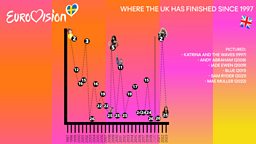
2023
Who represented the UK? Mae Muller - I Wrote A Song (25th)
Who won? Loreen - Tattoo
Memorable moments: With Ukraine, the previous year's winning nation unable to host the contest in 2023, the UK were invited to stage the event for the first time in 25 years, and Liverpool was chosen as the host city.
Eurovision fever gripped the nation, and the UK put on a memorable show on behalf of Ukraine, which featured many nods to past Eurovisions. However the feelgood factor didn't extend to voting for the UK entry, with Mae Muller's effort rewarded with just 24 points and a second-to-last finish, more in keeping with the country's recent Eurovision history.
Meanwhile, 2012 winner Loreen returned to claim her second Eurovision victory, and her country Sweden's seventh, moving them level with Ireland as the nation with the most wins. Which meant Sweden would host the 2024 Eurovision Song Contest, 50 years on from their 1974 win, courtesy of ABBA's Waterloo.
But will 2024 be the year Olly Alexander ends the UK's long wait for a sixth Eurovision winner?
